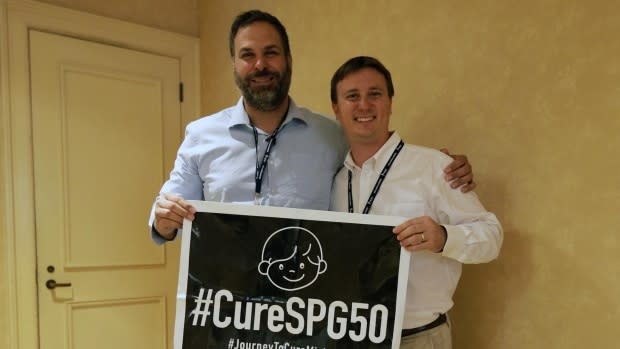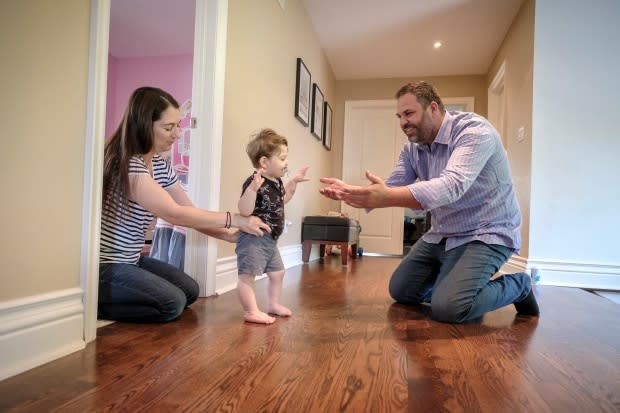Next frontier in medical fundraising? Toronto man turns to boot camp to help raise $3M for son's rare disorder
The latest stop in Terry Pirovolakis's journey to cure his son's rare genetic disorder is a boot camp: an intense, all-day session on how to win grants to fund expensive medical research.
It has now become part of how the Pirovolakis care for 21-month-old Michael.
There are the conventional appointments, like physio and occupational therapy. But the disease their son has is so rare and there is no treatment, leaving his parents with only one choice: to fund research to find a cure themselves — at a cost of about $3 million.
Michael Pirovolakis is believed to be the only child in Canada diagnosed with spastic paraplegia type 50, or SPG50, a disorder caused by a missing gene.
It threatens to degenerate the toddler's brain, which could rob him of his ability to move, speak and even breathe. But gene therapy may be able to halt — maybe even reverse — the degeneration that has already set in.

There are only 57 known cases of SPG50 in the world, including Michael, according to pediatric neurologists at Boston Children's Hospital.
This week, Terry Pirovolakis was in San Diego at conference called the Global Genes Summit, learning how to raise the money he needs to fund a clinical trial.
"If we're going to make $3 million, we need support, we need to hear from experts that have raised $20, $40, $50 million," he said. "How they did it, what worked, what didn't. We almost have to become experts at fundraising."
Community help
The Pirovolakis, who live in Toronto, have already become adept in community fundraising. Michael was diagnosed with SPG50 in April, and since then, the family has raised thousands by liquidating their savings, as well as through public events and donations via GoFundMe.
Their community has held all kinds of fundraisers big and small; their neighbourhood is blanketed in signs raising awareness of the cause.
"[It] makes us hopeful and shows us how good people can be. The generosity is amazing," said Michael's mother, Georgia Pirovolakis.
People show up the the Pirovolakis's door with cash and cheques. One little girl brought her tooth fairy money. Other children have donated their allowances and set up lemonade stands.
"The cutest is the little kids," Georgia said. "It was just so heartwarming to see.
"To see little kids helping little kids is just amazing. To those parents raising the children, I give them nothing but thanks and props for being such amazing parents and sharing the love and teaching them that they should help and give back."
While the family tries to overcome the daunting hurdle of raising millions, the biggest enemy is actually time. The longer it takes for the treatment to be funded, the greater the risk Michael will lose the ability to move. It's why his parents are trying every avenue to raise the money.

The boot camp Terry Pirovolakis attended at the Global Genes Summit showed participants how to write proposals to get funding from foundations. It also covered partnering with companies and legal matters, including managing intellectual property.
The broader conference focused on networking, with sessions geared to helping patients and their families push research forward. There were workshops titled "Rare Disease Research: Getting Your Disease Noticed" and "Developing Partnerships Among Rare Communities and Individual."
The clinical trial
The money raised by the Pirovolakis so far — about $665,000 — is funding the first phases of a clinical trial at UT Southwestern Medical Center in Dallas, Texas.
Researchers there have created a virus that will transport that missing gene to Michael's brain. It could cure him, they say, but more testing needs to be done. So more money is needed.

Without parents fundraising to get treatments for rare diseases, the research "just wouldn't get done," said Steven Gray, an associate professor and researcher at UT Southwestern Medical Center.
"This is the only way that things move forward for a rare disease," said Gray. "It makes it very personal for me and makes it worthwhile for us to go in the lab every day and do what we do."
'Willing to go anywhere'
"I'm willing to go anywhere," Terry Pirovolakis said. "From the very beginning of this journey, I told the doctors I'm willing to do anything, give up everything, if I have to. And this is part of that journey."
For now, what is keeping Terry going is imagining the day when they've raised enough money and Michael gets the experimental treatment.
"I envision that day, yes," he said, choking back tears. "And then that moment after, where he does the hard work to gain the stuff he's lost. Absolutely."
Georgia Pirovolakis says it's sometimes harder for her to visualize that day, as she watches her son struggle through all the different therapy appointments.
"I have days where I can't see it. Because I'm with him all the time, and I see him struggle, and I see him trying so hard. And sometimes it's hard for me to envision that moment," she said.
"Terry is more positive than me, but $3 million is a long way away. I hope it comes, I pray it comes. But when will it come, right?
"We'll get there. We'll get there."

